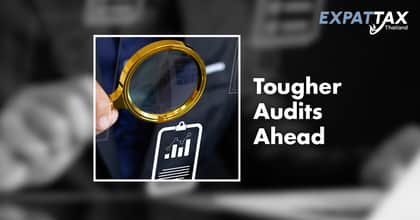The Thai Revenue Department has issued fresh warnings to influencers, live streamers and online sellers to ‘pay your fair share’. The campaign, widely covered by Bangkok Post and The Thaiger, signals tighter enforcement on the fast-growing creator economy.
What’s new is not the message, but the tone: the department is now using AI tools, data from major platforms like Shopee and Lazada and its RD10X digital enforcement unit to identify undeclared online income. The focus may seem local, yet the implications stretch to expats, foreigners and digital nomads based in Thailand.
How Thailand Taxes Online Income and Digital Businesses
If you earn income online while living in Thailand, you fall under the same tax framework as any other resident earner.
Key points:
- Personal Income Tax (PIT): Thailand applies progressive rates from 5 % to 35 % on taxable income. Thai-sourced income is always taxable, while foreign-sourced income becomes taxable once remitted to Thailand if you are a Thai tax resident.
- Tax Residency: You are considered tax-resident if you stay in Thailand for 180 days or more in a calendar year. Residency determines whether remitted foreign income may be taxed.
- VAT Registration: Required once annual turnover exceeds THB 1.8 million for businesses supplying goods or services in Thailand. This threshold applies to Thai-registered entities and to non-resident businesses making taxable supplies within Thailand. Voluntary registration is possible below that level.
- Corporate Tax: if operating through a registered company, corporate income tax applies.
The Revenue Department’s message is clear: digital income is taxable income.
Why Expats and Foreigners Should Pay Attention
The new enforcement push doesn’t just target Thai creators.
It affects:
- Expats working online: those living in Thailand and earning through platforms, affiliate marketing or remote work.
- Foreign influencers: those promoting Thai brands or earning ad revenue from Thai audiences.
- Digital nomads: those staying long-term under visas like the DTV who earn from abroad or from Thai clients.
- Online sellers: foreigners selling via Thai platforms or delivering to Thai customers.
If you live or earn from Thailand, you may have Thai-sourced income and obligations to register, file and pay tax accordingly. The Revenue Department’s focus is on fairness, ensuring everyone earning within Thailand’s borders, whether Thai or foreign, contributes under the same rules.
Key Risks for Influencers and Online Businesses
The Revenue Department has identified several recurring problem areas among online earners and digital entrepreneurs.
These are the most common and costly mistakes:
- Crossing the THB 1.8 million VAT threshold without registering or charging VAT.
- Earning from Thai sponsors or brands while in Thailand and failing to declare the income.
- Remitting foreign income into Thailand after becoming a tax resident, unaware that it may now be taxable.
- Staying long-term without a Thai Tax ID or filing any returns.
- Inadequate bookkeeping — missing invoices, weak expense records, or commingled personal and business funds.
- Assuming digital income is invisible to the Thai tax authorities, despite new data-sharing and AI enforcement tools.
The Revenue Department can audit up to five years back or even up to ten years if they suspect fraudulent behaviour, and penalties for undeclared income or late filings can be substantial — including back-tax assessments, fines and interest charges.
New Digital Enforcement: The RD10X Project, Platform Data-Feeds and AI-Driven Monitoring
Thailand’s tax authority isn’t relying on old-school audits alone. As outlined in the OECD’s overview of Thailand’s digital transformation, the Revenue Department is modernising its enforcement capabilities through initiatives such as RD10X. The project focuses on improving data analysis, automation and the monitoring of online economic activity, including influencers, e-commerce sellers and platform-based earners who might once have slipped through traditional systems.
RD10X and the Enforcement Toolkit
- Training and re-skilling: RD10X involves training local officers to shift from paper-based methods to digital tax compliance — especially for online business models and influencers.
- Platform data-sharing: The Revenue Department has entered into data-sharing arrangements (or is demanding reporting) with major platforms such as Shopee, Lazada, Grab and LINE Man. These feeds enable the tax authority to cross-check seller volumes, livestream commissions and promotional income.
- AI and big data analytics: The department is applying big-data tools and AI systems to track patterns of online trading, detect unusually high sales or mismatches (for example claims of huge livestream sales versus declared income).
- Risk-based auditing & digital journey: According to an OECD overview, the department’s roadmap includes smart-office programmes, e-filing, network-analysis of taxpayers, and prioritising high-risk digital income cases.
Why this Matters for Digital Earners
If you are an influencer, online seller or digital-nomad type earning income in Thailand (or from Thai audiences/clients), RD10X means that invisibility is more problematic to assume. Platform data may expose you, and AI systems may flag you for review even if you have previously filed nothing. In other words: the tax authority’s tools are catching up with the digital business models.
What You Should Take Away
The age of invisible income is over. Thailand’s tax systems now cross-check platform data, bank transactions and filing records through digital tools like RD10X.
Whether you’re an influencer, online seller or freelancer, the same principles apply:
- Don’t assume you’re too small to notice. Even modest accounts can be flagged through data-matching and AI filters.
- Keep robust records. Accurate invoices, receipts, and expense documentation strengthen your position if reviewed.
- Track your timelines and volume. Sudden spikes in income or viral sales can attract special scrutiny.
- Match your filings to your data. What appears in your platform dashboards and bank statements should align with your PIT, VAT or corporate filings.
- Understand your status. Whether resident or non-resident, income linked to Thai platforms or audiences can still be visible to the Revenue Department.
In short, Thailand’s tax enforcement is becoming data-driven, not declaration-driven. The smart move is to stay compliant before the system finds you.
Step-by-Step: Staying Compliant with Thai Tax Laws
- Confirm your residency status. Over 180 days? You’re likely a Thai tax resident.
- List all income streams. Include online sales, affiliate income, sponsorships and remote salaries.
- Classify the source. Identify what’s Thai-sourced and what’s foreign.
- Check VAT obligations. Track sales volume — THB 1.8 million triggers registration.
- Maintain records. Keep invoices, receipts and platform earnings statements.
- File on time. PIT returns by March 31 each year, VAT filings monthly.
- Get advice. A tax advisor can help you interpret residency and remittance rules.
The Bigger Picture: Thailand’s Digital Economy and Global Alignment
Thailand’s tightening of digital income rules is part of a worldwide shift toward greater tax transparency and fairness in the digital economy. The Revenue Department’s approach aligns with OECD standards on digital taxation. It mirrors the steps taken by major economies in Asia and Europe to close gaps created by cross-border online work, streaming and e-commerce.
These changes signal Thailand’s intent to modernise its tax base while maintaining credibility with global partners. For digital creators, nomads and entrepreneurs drawn to Thailand’s lifestyle, it means the country is no longer a low-visibility haven for online income.
Compliance is now an essential part of operating in Thailand’s digital economy — and the tools the Revenue Department uses to detect undeclared income are getting smarter every year.
Watch Our Webinar: DTV Visa & Thai Tax Explained

Final Takeaway: Digital Doesn’t Mean Untaxable
The days of operating ‘under the radar’ are over. Whether you’re livestreaming from Bangkok, freelancing from Chiang Mai or selling through Shopee, Thai tax laws apply if your activity touches the Thai market or you spend enough time here to be considered resident.
Thailand’s Revenue Department is investing heavily in digital tools and international cooperation to close the tax gap. The message is clear: digital income is real income, and ignoring it is no longer an option.
Now is the time to review your position, understand your obligations and take action before the next tax season.
If you’re unsure how the new rules affect you, book a free consultation with our support team. We’ll assess your situation, explain your options and help you stay compliant while keeping your tax simple.
Frequently Asked Questions
Tax Net Tightens
RD10X is a digital transformation programme launched by the Thai Revenue Department to improve tax compliance in the digital economy.
It focuses on retraining officers, automating processes and using data analysis to identify undeclared online income. The project is part of Thailand’s wider effort, outlined in the OECD’s digital transformation overview, to modernise tax administration.


